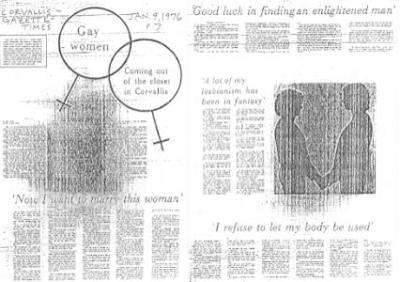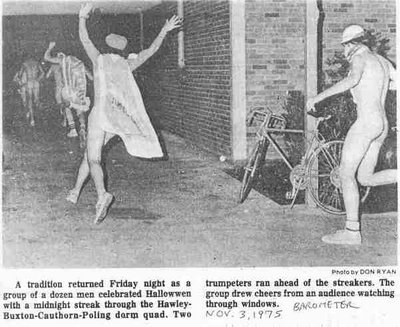PHOTO: front and back pages of local newspaper coverage of the June 2014 Pride month in Corvallis celebrating a court decision legalizing gay marriage in Oregon. See Corvallis Pride 2014 Festival pridecorvallis.org/2014festival/ and newspaper story by Canda Fuqua, "A Celebration of Marriage: Pride in the Park festival celebrates same-sex weddings," Gazette-Times, Jun. 29, 2014, p. A1, A8 published online as "Marriage theme takes off at Corvallis gay pride event". (Also, see previous post Gay marriage boosts Pride turnout in Corvallis, Oregon (6/30/13) about last year Pride event coverage and gay women quoted as wanting to get married in a 1970's newspaper story and previous post Mainstream ignoring US Supreme Court's 1972 gay marriage decision (12/11/12).)
PHOTO: scan of an original cellophane-taped scrapbook clipping of a 1971 newspaper story about the 1970 gay marriage of Michael McConnell and Jack Baker, which led to the first U.S. Supreme Court decision on gay marriage in 1972 -- Bob Protzman, staff writer, "'Gay' Marriage OK Predicted," St. Paul, Minnesota Pioneer Press, Oct. 22, 1971. (See personal blog page by Jack Baker, "Marriage equality was inevitable DFL party demanded equal marriage in 1972," box8661.blogspot.com posted June 13, 2013, edited May 11, 2014, accessed Jun. 29, 21014) I have transcribed below, for me and my blind and low vision readers, the full text of the above newspaper article and also annotated it with my comments in parentheses: (COMMENT: It is telling that an editor made the journalistic decision to add quotes around the word "gay" in the headline, because the story said "gay" was the term preferred by Baker, and the story also used the phrase, "same-sex marriage," which did not become standard usage by newspaper editors until years later when newspapers probably adopted it to sound unbiased when reporting on the politically volatile issue of gay marriage.)
Jack Baker, an admitted homosexual and third-year law student, told the Ramsey County (Minnesota) Bar Association (a professional group of lawyers) Thursday he is confident same-sex marriages will be legalized in the United States. (COMMENT: it was common journalistic practice to use the criminal reporter's term "admitted" to avoid a libel lawsuit and this usage was also probably encouraged by the fact homosexual acts were criminal in most states.)
Baker, whose invitation to speak to the organization at its monthly luncheon in the St. Paul Athletic Club stirred some criticism from members, began his talk by saying what a pleasure it was for him to be able to speak to the Bar Association. (COMMENT: ironically, the Athletic Club was a place that some gay men frequently cruised for sex partners amongst the rich and powerful men who regularly networked and struck business deals in the club.)
He added, "Especially since the bar put extreme pressure on the University of Minnesota law school two years ago to refuse to allow me to enroll. (COMMENT: gay men were routinely barred from military service and discriminated against under the assumption they would engage in then illegal homosexual sodomy acts.)
This comment drew no response from the 96 or so lawyers and their friends at the luncheon -- a turnout which program committee chairman Bert McKay said was "average."
McKay said he had "heard from some lawyers that some lawyers" were complaining that Baker was invited to speak at the luncheon. He said no complaints were made directly to him or to his knowledge anyone else on the program committee.
Baker, 29, Minnesota Student Association president (COMMENT" commonly called the University of Minnesota student body president) explained his recent legal actions, which have included his being adopted by, then married to James McConnell, also 29. (COMMENT: born circa 1941 or 1942 -- age 72 or 73 in 2014)
He told the lawyers he thinks that same-sex marriages, or marriages between homosexuals, or "gay" people (the term he prefers), are not only authorized by the U.S. Constitution, but are also mandatory.
"I am convinced," he said, "that same-sex marriages will be legalized in the United States." He did not predict when this might occur.
Last week, the Minnesota Supreme Court ruled in a unanimous decision that state law prohibits marriage between persons of the same-sex. (COMMENT: the decision did not order his legally performed marriage to be annulled.)
Baker said he does not believe the decision invalidates his marriage. He said the decision will be appealed to the U.S. Supreme Court. "I think we have a good case and will win it," he said. (COMMENT: in 1972 the U.S. Supreme Court issued a one-sentence ruling , which essentially left the definition of marriage to state law, and the court did not issue any order annulling Baker's legally performed marriage under a Minnesota law that did not specify gender.)
In a second court case, this one involving only McConnell, the 8th Circuit Court of Appeals in St. Louis upheld this week the right of the University of Minnesota to refuse a librarian job to an admitted homosexual. "That verdict probably will be appealed to the U.S. Supreme Court, also, Baker said. (COMMENT: McConnell was forced to take job with another public library system, where he had a long and successful career until he retired.)
Baker discussed this and his lawyers' legal positions about same-sex marriages. In a question-and-answer session following his talk, he said the gay movement and women's liberation movement have much in common. (COMMENT: Women liberationists were central to the founding of gay activist groups, including the one at Oregon State University.)
Both groups want to knock down the artificial roles assigned to men and women, to establish that men and women are people and equal in all respects -- except for the "plumbing," he said.
He said, in answer to questions, that he does not believe there has been any increase in the number of homosexuals in recent years, but that because of increased activism by some gay people, many others "are coming out of the closet." (COMMENT: A common fear back then was that one could be made gay by being molested by a homosexual pervert and gay liberationists were actively using "coming out" as a political strategy.)
He estimated that there are 70 active gay people at the University of Minnesota, "There are many friends of gay people," he said. (COMMENT: I was one of 50,000 students at the U of M at this time and I concur with his estimate based on the number of people you would see at bars, meetings and rallies. At the time, gay activists would often say the "Kinsey Report" said that 10 percent of all people are gay, an oversimplification of the data that only wasted time arguing about the accuracy of the data instead of the fact that all men should be treated equally under the law.)-
(Quoted from Bob Protzman, staff writer, "'Gay' Marriage OK Predicted," St. Paul, Minnesota Pioneer Press, Oct. 22, 1971)

PHOTO: Jan. 9, 1976 feature article by Anne Wood, "Gay women: Coming out of the closet in Corvallis, 'Now I want to marry this woman,'" on p. 7-8 of Corvallis Gazette-Times. One of the women profiled in the article came out in a letter to the editor of her student newspaper and she was active in early gay women's groups at Oregon State University. (See previous post Gay 1976 newspaper controversy (5/3/06))
PHOTO: An original printed bound copy of first U.S. Supreme Court decision on same-sex marriage, which was one-sentence long, is available for viewing in the OSU Valley library. The first gay marriage case was initiated by University of Minnesota law student Jack Baker in and his lover Michael McConnell in 1970 after they noticed that Minnesota State law did not specify the gender of married couples and they got married: Baker et al. v. Nelson, Oct. 10, 1972, "United States Reports, Volume 409, Cases Adjudged in the Supreme Court, October Term, 1972," U.S. Government Printing Office, 1974, p. 810. (See previous posts Mainstream ignoring US Supreme Court's 1972 gay marriage decision (12/11/12), Baker v. Nelson 1972 Supreme Court order on gay marriage (7/22/09), Arthur Leonard CA Prop 8 appeal still citing Jack Baker gay marriage case (8/3/12) and (NY Constitutional law Professor) Arthur S. Leonard on Baker v Nelson gay marriage case (7/28/09))
See my previous posts and other links of interest:
- My previous post from last year: Gay marriage boosts Pride turnout in Corvallis, Oregon (6/30/13) linked to the following newspaper coverage:
- Canda Fuqua, "A dose of Pride: More Pride than ever, Supreme Court ruling on gay marriage helps bolster crowd at annual Corvallis Event," Corvallis Gazette-Times, Jun. 30, 2013, p. A1, A10
- Canda Fuqua, "A Celebration of Marriage: Pride in the Park festival celebrates same-sex weddings," Jun. 29, 2014, p. A1, A8 published online as "Marriage theme takes off at Corvallis gay pride event"
- Personal blog page of Jack Baker, "Marriage equality was inevitable DFL party demanded equal marriage in 1972," box8661.blogspot.com posted June 13, 2013, edited May 11, 2014
- Jack Baker, "Index," "Self Pride promoted worldwide by U of M students," box8661.blogspot.com posted June 10, 2013, updated May 15, 2014 personal blog page said, "The dream of marriage equality began at the University of Minnesota. Self Pride spread world wide."
- , "Jack Baker deserves mainstream press coverage after gay marriage ruling," tomsosu.blogspot.com posted Jul 7, 2012 -- includes photo of first U.S. Supreme Court decision on gay marriage bound in the original printed and bound copy in the OSU law library.
- Gay Oregon Judge acknowledges validity of 1972 "Baker" gay marriage case by ruling it obsolete (3/31/14)
- Magnus Hirschfeld, Jack Baker, University of Minnesota and Oregon State University gay connection (1/21/12)
- Arthur S. Leonard, a professor at New York Law School since 1982, has written much on the legal history of gay rights, including the following posts:
- Arthur S. Leonard, "A Pride Week Trifecta," gaycitynews.com Jun. 26, 2014 - "In a burst of pro-gay rulemaking, federal appeals and trial courts on June 24 and 25 issued important pro-gay decisions, advancing not only the cause of marriage equality but also the broader fight for constitutional anti-discrimination protections." Leonard also mentions that Jack Baker's pioneering U.S. Supreme Court case on gay marriage was part of the case: "The court's majority also rejected Utah's argument that the Supreme Court's decision not to hear a gay marriage case back in 1972 -- for lack of a "substantial federal question" -- was still binding on lower courts. Subsequent high court rulings since then superseded that precedent, the court found."
- Art Leonard, "Pride Week Trifecta: Three Federal Courts Issue Important Pro-Gay Decisions," artleonardobservations.com posted Jun. 25, 2014 -- Leonard's personal blog






